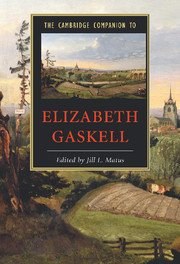Book contents
- Frontmatter
- 1 Introduction
- 2 The life and letters of E. C. Gaskell
- 3 Mary Barton and North and South
- 4 Cranford and Ruth
- 5 Elizabeth Gaskell’s The Life of Charlotte Brontë
- 6 Sylvia’s Lovers and other historical fiction
- 7 Cousin Phillis, Wives and Daughters, and modernity
- 8 Elizabeth Gaskell’s shorter pieces
- 9 Gaskell, gender, and the family
- 10 Elizabeth Gaskell and social transformation
- 11 Unitarian dissent
- 12 Gaskell then and now
- Guide to further reading
- Index
- Series List
6 - Sylvia’s Lovers and other historical fiction
Published online by Cambridge University Press: 28 May 2007
- Frontmatter
- 1 Introduction
- 2 The life and letters of E. C. Gaskell
- 3 Mary Barton and North and South
- 4 Cranford and Ruth
- 5 Elizabeth Gaskell’s The Life of Charlotte Brontë
- 6 Sylvia’s Lovers and other historical fiction
- 7 Cousin Phillis, Wives and Daughters, and modernity
- 8 Elizabeth Gaskell’s shorter pieces
- 9 Gaskell, gender, and the family
- 10 Elizabeth Gaskell and social transformation
- 11 Unitarian dissent
- 12 Gaskell then and now
- Guide to further reading
- Index
- Series List
Summary
“But history, real solemn history, I cannot be interested in . . . The quarrels of popes and kings, with wars or pestilence, in every page; the men all so good-for-nothing, and hardly any women at all - it is very tiresome: and yet I often think it odd that it should be so dull, for a great deal of it must be invention. The speeches that are put into the heroes' mouths, their thoughts and designs - the chief of all this must be invention, and invention is what delights me in other books.”
Jane Austen, Northanger Abbey (1818)“[T]he novel is history. That is the only general description (which does it justice) that we may give to the novel.”
Henry James, “The Art of Fiction“ (1888)Between 1818 and 1888 historical study and the writing of realist fiction are in the ascendancy. The novel becomes respectable and its claim to respectability rests on its proximity to history, its likeness to life: as Henry James says, ''In proportion as in what [fiction] offers we see life without rearrangement do we feel that we are touching truth.'' At the same time, the study of history becomes self-conscious, reflective, and increasingly concerned with the lives of common people; this growth of modern historicism owes much to its competitive proximity to the novel. Each discourse is implicated in the other. In terms which could apply equally to the realist-historical novel, outgrowing its Gothic and picaresque ancestry, Thomas Carlyle noted a new era for historians as early as 1830: whereas history was once concerned to gratify ''our common appetite for the wonderful, for the unknown,'' modern history is now no longer to do with battlefields, senate houses, and kings' antechambers but with ''the dark untenanted places of the Past, where, in formless oblivion, our chief benefactors . . . lie entombed.'' Social life, he writes, ''is the aggregate of all the individual men's lives . . . History is the essence of innumerable Biographies.''
- Type
- Chapter
- Information
- The Cambridge Companion to Elizabeth Gaskell , pp. 75 - 89Publisher: Cambridge University PressPrint publication year: 2007
- 2
- Cited by



